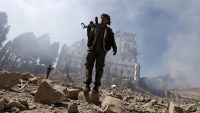
Trump’s error on Jerusalem is a disaster for the Arab world … and the US too
Every time it seems Donald Trump cannot outdo himself, he does it again. Now he has announced that his administration will recognise Jerusalem as Israel’s capital, reversing nearly seven decades of American policy. This step will have multiple negative ramifications, many impossible to predict.
Jerusalem is the most important of the so-called final status issues that have been repeatedly deferred during the Israel-Palestine negotiations because of their extreme sensitivity. Trump has ploughed into this imbroglio like a bull in a china shop, zeroing in on the most complex and emotional issue of all those connected to Palestine.
Jerusalem is undoubtedly the most important aspect of the entire Palestine question.… Seguir leyendo »





